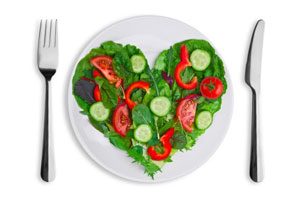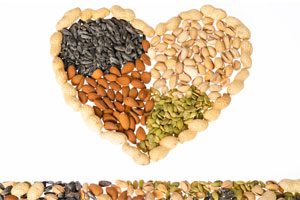 There is a famous saying – the way to man’s heart is through his stomach. While the accuracy of this saying cannot be proven, there are a lot of clinical studies and research findings that show that the stomach is definitely the way to a man’s healthy heart. And for that matter, even a woman’s healthy heart.
There is a famous saying – the way to man’s heart is through his stomach. While the accuracy of this saying cannot be proven, there are a lot of clinical studies and research findings that show that the stomach is definitely the way to a man’s healthy heart. And for that matter, even a woman’s healthy heart.
So it’s important to have a diet filled with healthy foods and steer clear of the unhealthy ones. But it’s not as easy as it s it sounds. Everybody has a different opinion of what is healthy and what is not. And the glut of information available only makes things that much more confusing.
Rather than give you a long list of heart healthy foods and their heart health benefits, I’ll give you a broad range of foods that you should include in your diet. Together, these foods will help lower your cholesterol, strengthen your heart muscles, maintain healthy triglyceride levels, prevent inflammation, keep your arteries flexible, and deliver many other heart healthy benefits.
Advertisement
The basic rule is these foods have to be low in saturated fats, sugars, calories, and high in fiber. They also need to have disease-fighting antioxidants, phytosterols and flavonoids – fancy terms you’ll come across for natural compounds found in whole foods.
My favorite foods for a healthy heart, listed below, definitely have one if not more of these heart health properties:
Vegetables and fruits that help your heart
Remember your mom telling you to finish up your veggies? She had a very good reason for doing so. While fresh, healthy vegetables and fruits play an important role in your overall health, they are especially beneficial for your heart.
Veggies are high in vitamins, minerals and fiber, and low in fat and calories. Some of the vegetables for heart health to get onto your plate are asparagus, bell peppers, carrots, tomatoes, broccoli, and leafy greens. As for fruit, as long as you eat in moderation, every fruit is good. The American Heart Association recommends that at least half your dinner plate should be piled with vegetables. I realize some of you might not like eating veggies, which is why for my next set of heart healthy food I’ve chosen…
Spices and herbs that are heart healthy
There are many spices and herbs that not only make your heart healthy, they also make your vegetables taste good.
Garlic
The most important of these is garlic (though not technically a spice or an herb, but in fact a vegetable that does the job of adding flavor to food). Since 1500 B.C., healers in China and India have used garlic for various remedies.
But more recently a team of researchers from the Cardiovascular Research Center at the University of Connecticut School of Medicine have proven that freshly crushed garlic protects the heart. The way I see it, it is the most user-friendly of all heart health foods as it is available in almost every kitchen, is inexpensive and it can boost the flavor of almost any cuisine.
Turmeric
Another flavor-booster known for heart health is turmeric. This yellow spice is packed with many compounds that have antioxidant and anti-inflammatory properties. The problem with turmeric is that unlike garlic, it does not adapt to most cuisines. But don’t let that deter you. There are a lot of exotic turmeric smoothie recipes and even turmeric teas that you could easily make a part of your diet.
Grass-fed meat and heart health
 For serious meat eaters, meat is meat. As long as it is done to their exact liking, they do not really care what animal they are eating. But the truth is, there is a great difference between grain-fed and grass-fed animals. And if you take a little care, you can eat your meat and still remain heart healthy.
For serious meat eaters, meat is meat. As long as it is done to their exact liking, they do not really care what animal they are eating. But the truth is, there is a great difference between grain-fed and grass-fed animals. And if you take a little care, you can eat your meat and still remain heart healthy.
If you want heart healthy meats, you need not look beyond grass-fed meats. They tend to be much lower in total fat than grain-fed meat. A sirloin steak from a grass-fed steer has almost one-third the amount of fat as a similar cut from a grain-fed steer. In fact, grass-fed meat has as little fat as a skinless chicken. Meat this lean can actually lower your “bad” LDL cholesterol levels. The other advantage of grass-fed meat is that its low calories.
Just changing your meat from grain-fed to grass-fed means you avoid consuming an extra 18,000 calories every year, depending on how much meat you’re eating. Think about that for a moment. Just by this one seemingly insignificant change, you could lose about six pounds a year. Imagine the positive effect that will have on your heart. Another advantage of grass-fed meat is that it gives you a lot more omega-3 fatty acids. Which brings me to my next heart healthy food…
Nothing beats omega 3-rich fish for heart health
 There is plenty of evidence that people who eat fish regularly are less likely to have heart attacks. So do your heart a favor and eat at least two servings of fish every week. And please don’t settle for just omega-3 fish oil supplements. While they are beneficial, the American Heart Association does not consider them a sufficient replacement for eating fish. Plus, there’s also the chance that when you eat fish, you cut some other protein from your diet that may be less healthy.
There is plenty of evidence that people who eat fish regularly are less likely to have heart attacks. So do your heart a favor and eat at least two servings of fish every week. And please don’t settle for just omega-3 fish oil supplements. While they are beneficial, the American Heart Association does not consider them a sufficient replacement for eating fish. Plus, there’s also the chance that when you eat fish, you cut some other protein from your diet that may be less healthy.
If you are stumped by what kind of fish to eat, how to cook it, or where to buy it, relax. Firstly, any fish is better than no fish. So don’t just stick to one type. The idea is to eat more fish and enjoy it. Try different recipes as long as it does not involve deep frying. Once you get used to eating fish, try eating more of omega-3-rich fish like salmon, mackerel, tuna, sardines and bluefish, which are really good for the heart.
Remember, you need to eat fish at last twice a week. So don’t sweat over small details like farm-raised fish or fish caught in the wild. Just go for affordability and convenience. The only excuse for not eating fish is that you are strictly vegetarian, in which case you need a suitable substitute: Flaxseed, walnuts, soybeans and canola oils can boost your vegetarian fare into an omega-3-rich diet.
Whole grains and a healthy heart go hand-in-hand
 For thousands of years, humans ate grains that came straight from the stalk. So they got fiber, healthy fats, vitamins, minerals, plant enzymes, hormones, and hundreds of other phytochemicals that are heart healthy.
For thousands of years, humans ate grains that came straight from the stalk. So they got fiber, healthy fats, vitamins, minerals, plant enzymes, hormones, and hundreds of other phytochemicals that are heart healthy.
But today, thanks to refining the grains, we’ve sacrificed nutrition for taste and convenience. The refining process strips away most of the vitamins, and virtually all of the fiber. It also makes the starch easily accessible to your body which is not good.
According to Harvard research, eating whole grains substantially lowers total cholesterol, bad cholesterol, triglycerides, and insulin levels. Any of these changes can reduce the risk for cardiovascular disease.
Many people think they are being healthy by eating multi-grain bread. This is junk food masquerading as healthy. You are much better off eating straight-up barley, brown rice, quinoa, or steel-cut oats. I cannot stress the importance of whole grains for heart health enough, so here is a recipe that I rustle up very often. It is from Harvard University Dining Services:
Heart Healthy Grain Pilaf
Serves 4
½ cup wheat berries
¼ cup pearl barley
¼ cup wild rice
2 cups water
¼ cup minced red onion
Salt (optional) to taste
Combine the grains and water in a medium saucepan. Bring to a boil over high heat. Reduce the heat to low and cover. Simmer until all the water is absorbed, about one hour. Remove from the heat. Add the minced onions, salt (if desired, but don’t over-do it) to taste, stir and serve.
I know eating whole grains might not be to everyone’s liking, so for my next heart healthy ingredient I’m including… surprise, surprise…
Chocolate is good for your heart. Really!
You better believe it! Chocolate contains flavonoids that act as antioxidants which help the cardiovascular system. When Harvard researchers studied the effects of cocoa flavonoids on heart risks, they found that the flavonoids reduced unhealthy LDL cholesterol, blood pressure, and insulin resistance, and increased healthy HDL cholesterol, and improved blood flow.
The thing to remember here is not all chocolate is good. As a simple rule of thumb, the darker the chocolate, the healthier it is for your heart.
Avoid white chocolate, and chocolate with fillings such as caramel or nougat. These fillings are just added sugar and fat. Also, don’t go overboard. While chocolate is beneficial for health, it is still a high-calorie, high-fat food. So moderation is key. About 50 to 60 grams every week is a good ball park.
Make heart healthy diet a habit
I’m not for a moment suggesting that you eat each of the above heart health foods daily. That would be boring and you’ll soon lose interest in eating them. What I want you to do is be aware of them, stock them in your pantry or fridge and experiment with them.
See which whole grain goes well with a piece of dark chocolate. Try a fish and turmeric curry. Keep experimenting. One of the great things about the internet is there are thousands of healthy recipes using only heart healthy meats, and other heart healthy foods. Go ahead and be adventurous. You will not only keep your heart healthy, you will keep your taste buds happy, too.
Last but not least, some heart health don’ts
When it comes to heart health, what you don’t eat is as important as what you eat. Please know that for optimum heart health, an adult’s daily diet should consist of roughly 2,000 calories, fewer than 1,500 milligrams of sodium, fewer than 16 grams of saturated fat and fewer than 300 milligrams of cholesterol.
There are certain foods that have all that and more in a single meal. Supermarket precooked meals, pizzas, nachos and cheese, restaurant steaks, and smoked and cured meats. Sugar also isn’t good for the heart so stay off that cola, energy drink and gourmet ice cream.
Before signing off, I’d like to add – get used to making food at home. Home is where the heart is. And home is definitely where the heart healthy food is.
Advertisement
Related Reading:
New superfood for your heart
Coffee for your heart? New research says yes to four cups daily
